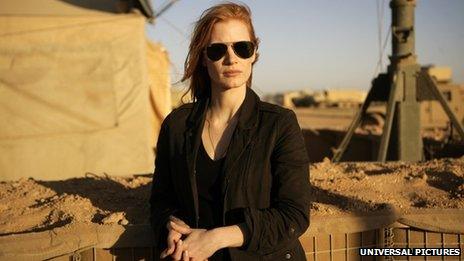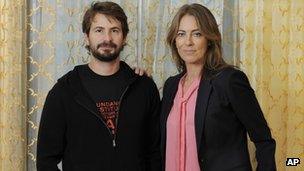Zero Dark Thirty: Senate committee reviews CIA contact
- Published

Jessica Chastain plays a CIA agent seeking Bin Laden in Zero Dark Thirty
The US Senate Intelligence Committee has demanded more information about contacts between the CIA and the makers of Oscar favourite Zero Dark Thirty.
Kathryn Bigelow's film is a dramatised account of the hunt for Osama Bin Laden and the 2011 mission which killed him.
In a letter to Acting CIA Director Michael Morell, three senators said the film-makers could have been misled by information provided by the CIA.
The film has been nominated for four Golden Globes.
Ahead of the US elections, Bigelow's film was accused of being a propaganda tool intended to assist President Barack Obama's re-election campaign.
The US release of the film was subsequently put back until after November's election.
'Film-makers misled?'
The lawmakers have requested to see a copy of all the documents given to the film-makers by the CIA.
The letter, external, co-signed by Senate Intelligence Committee members Dianne Feinstein, Carl Levin and former presidential candidate John McCain, expressed concern over the "clear implication" in the film that extreme interrogation techniques had played a key role in locating Bin Laden.

Screenwriter Mark Boal and director Kathryn Bigelow worked together on the Oscar-winning The Hurt Locker
"Given the CIA's cooperation with the film-makers and the narrative's consistency with past public mis-statements by former senior CIA officials," the letter says, "the film-makers could have been misled by information they were provided by the CIA."
The letter adds that the film's narrative conflicts with official statements that the CIA did not first learn about a Bin Laden courier through a CIA detainee who had been subjected to "coercive interrogation techniques".
It also said that, according to a separate Senate review, the most accurate information about the courier had been provided by a CIA detainee prior to any harsh interrogation.
The three US senators also wrote to the head of Sony Pictures Entertainment shortly before Christmas saying the film was "inaccurate".
The senators claimed that Zero Dark Thirty "clearly implies that the CIA's coercive interrogation techniques were effective in eliciting important information related to a courier" for Bin Laden, who would unknowingly lead the agency to his compound in Pakistan.
Bigelow and screenwriter Mark Boal - who won Oscars in 2010 for The Hurt Locker - said last month the film depicted "a variety of controversial practices and intelligence methods".
They said: "The film shows that no single method was necessarily responsible for solving the manhunt, nor can any single scene taken in isolation fairly capture the totality of efforts the film dramatises."
On Wednesday, The Hollywood Reporter, external reported that the Committee had begun an examination of records charting contacts between intelligence officials and Bigelow and Boal.
Reuters said the committee would also assess "whether CIA personnel are responsible for the portrayal of harsh interrogation practices, and in particular the suggestion that they were effective".
BBC Talking Movies' Tom Brook reviews the film and meets the director
A spokesperson for Sony told The Hollywood Reporter: "As the studio distributing Zero Dark Thirty in the United States, we are proud of this important film. Kathryn Bigelow, Mark Boal and their creative team have made an extraordinary motion picture and we fully support bringing this remarkable story to the screen."
The film's title is a military term for half-past midnight, the local time at which Bin Laden's compound in Abbottabad, Pakistan, was raided by US Navy Seals.
It opens across the US on 11 January and in the UK on 25 January and is also considered a likely Oscar contender.
- Published20 December 2012
- Published4 December 2012
- Published6 December 2012
- Published23 December 2012
- Published13 December 2012